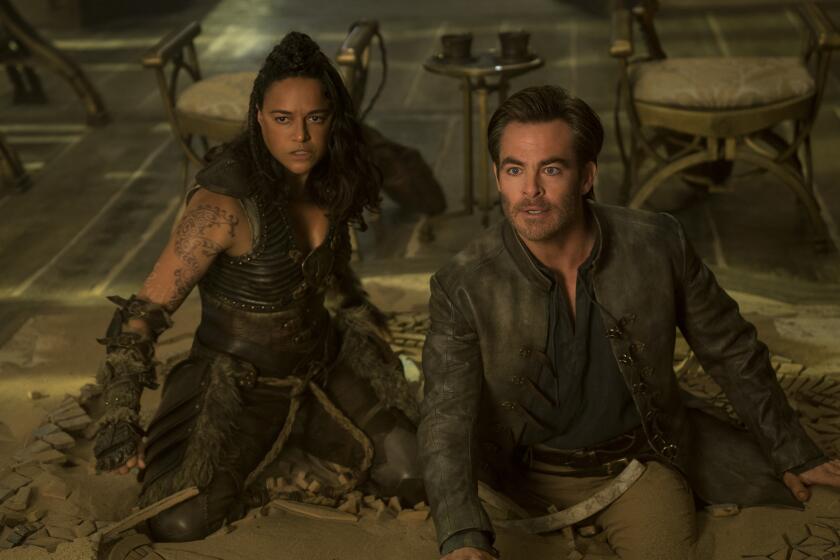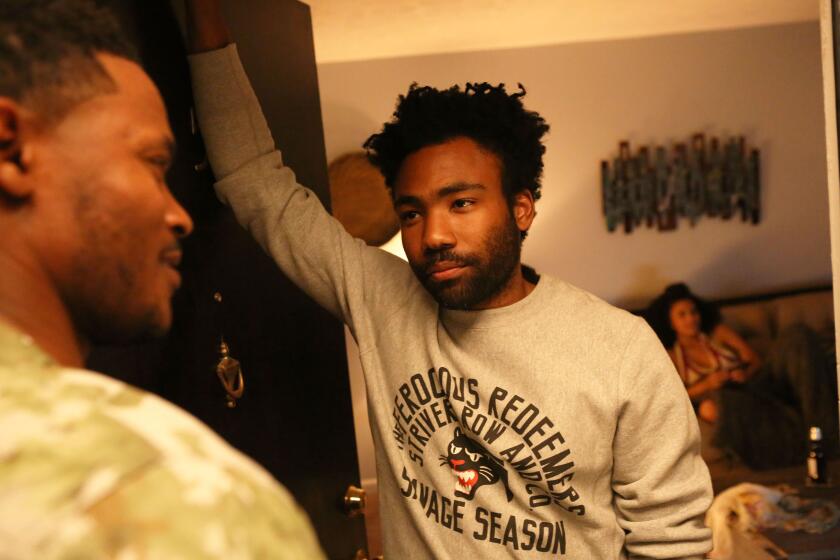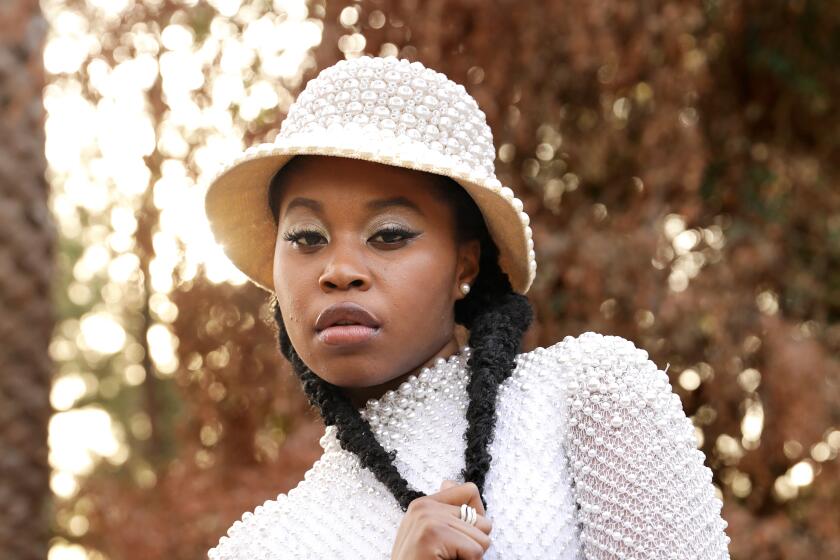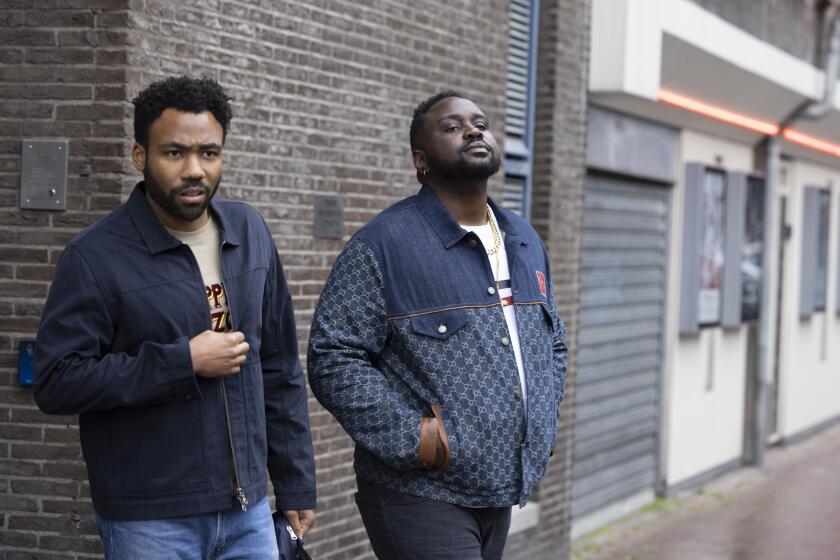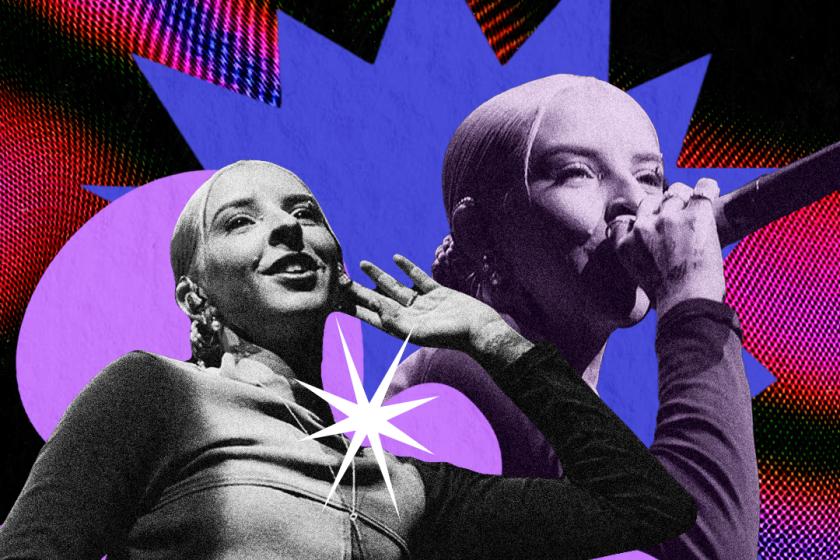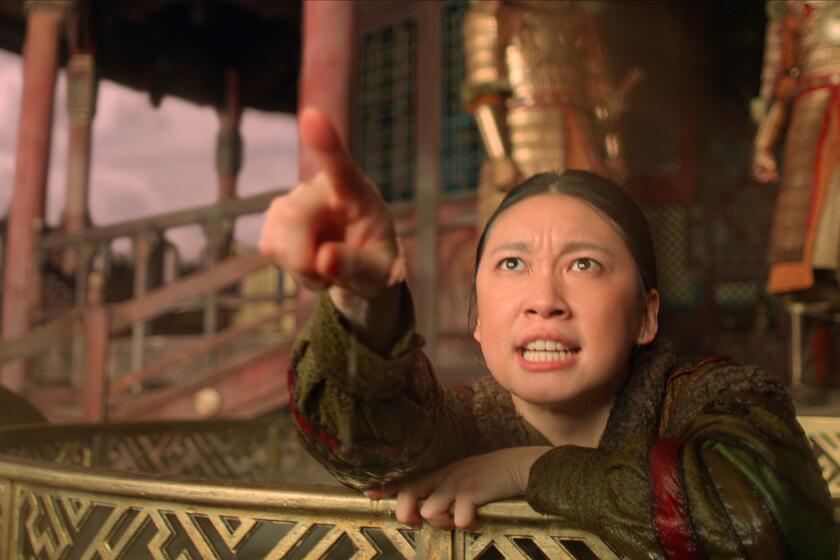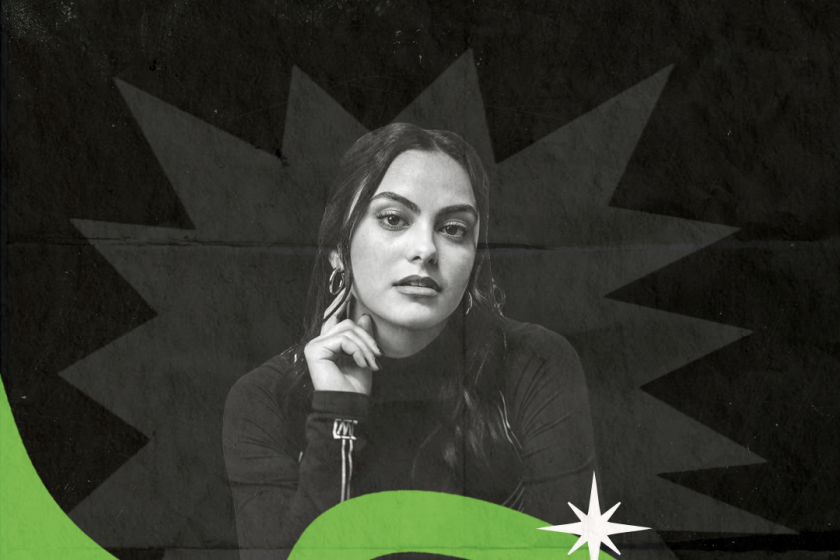Donald Glover and Janine Nabers’ new show ‘Swarm’ takes the Beyhive to the extreme
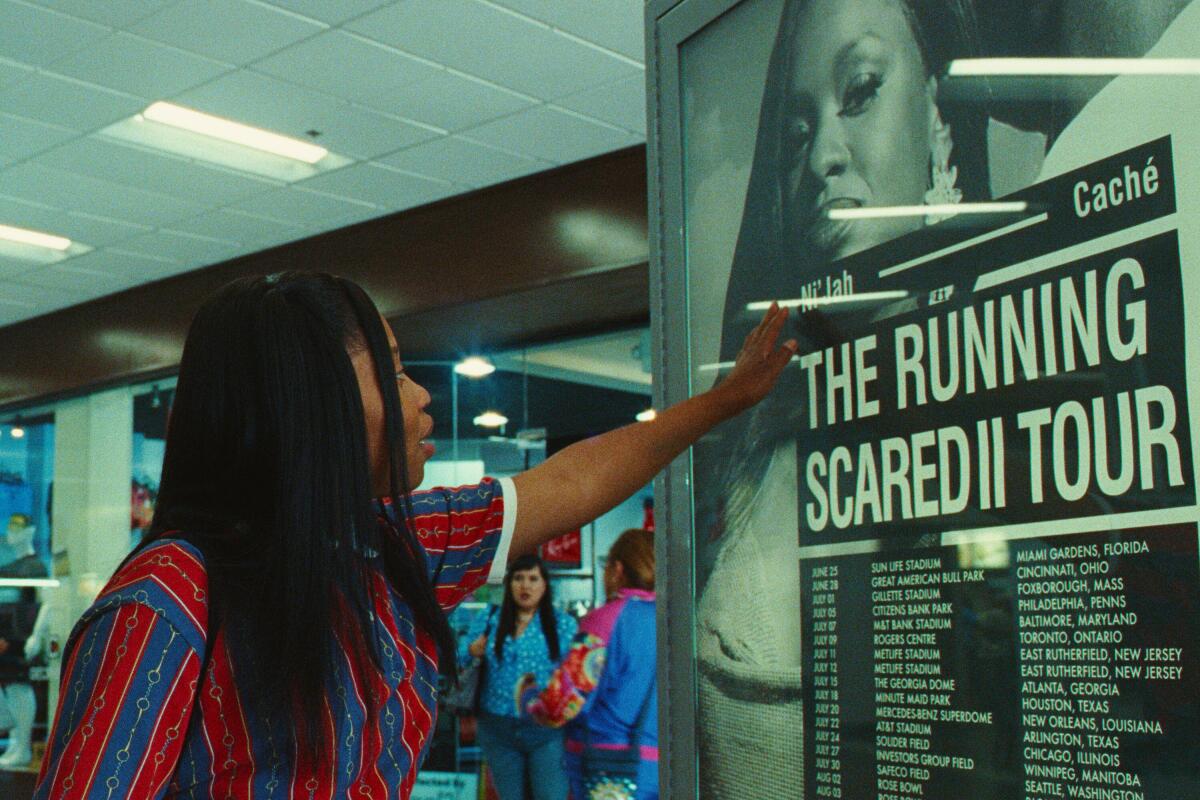
- Share via
Janine Nabers‘ “Swarm,” a limited series about a deranged fan willing to murder in defense of her idol, is both an unexpected and tenable follow-up to the TV writer and playwright’s most recent works.
Nabers, who contributed to the final season of Donald Glover’s seminal FX series “Atlanta” (which ended in November), takes the helm this time around as showrunner and head writer, although they split creator and executive producer duties.
“Swarm,” which continues in the “Atlanta” tradition of outlandish and erratic storytelling, follows Dre (Dominique Fishback) — a Houston native and die-hard fan of the pop phenom Ni’Jah. Ni’Jah is a blatant avatar for Beyoncé, down to her tour costumes and music mogul husband, Caché. But Nabers insists that the show is not specifically targeted at the Beyhive. “It’s really just allowing people to see themselves in the madness of Dre because we took real events and put a person in the middle of it,” she said.
With a SXSW title, ‘Everything Everywhere All at Once,’ a strong contender for Oscars, the Austin, Texas-based festival returns with a feather in its cap.
Each episode opens with the disclaimer, “This is not a work of fiction. Any similarity to actual persons, living or dead, or actual events, is intentional.” And although the character of Dre is indeed fictitious, many of the pop culture events and crimes depicted are real.
“We did research for months to basically find events [between 2016 and 2018] that we could put our main character in,” said Nabers. “So it’s really not a work of fiction. We’ve taken real internet rumors, real murders and combined them in the narrative of our main character, Dre. Not much of it is fabricated.”
The seed of the idea was planted during the final season of “Atlanta,” when Glover pitched the general premise of a homicidal superfan to Nabers. “And then we ran with it during COVID,” she said. “I created this with [Glover], a music artist who has his own kind of swarm and fanbase, so we drew from experiences both personal and [not]. So I think it’s OK for people to say, ‘They remind me of the Barbz or the Swifties.’ That’s the conversation that we want people to have.”
Donald Glover’s FX series, which concludes Thursday, didn’t always hit home runs. But it swung for a league’s worth of ballpark fences.
“It would be great if there was a way for people to look outside of themselves and [examine] what their relationship with certain celebrities are,” she added. “A lot of people take ownership of people they love that they’ve never met before and as wild as Dre is, and as extreme as some of her actions are, when you pull back the curtain of obsession and fandom, I think there are a lot of people who can relate to her in some way.”
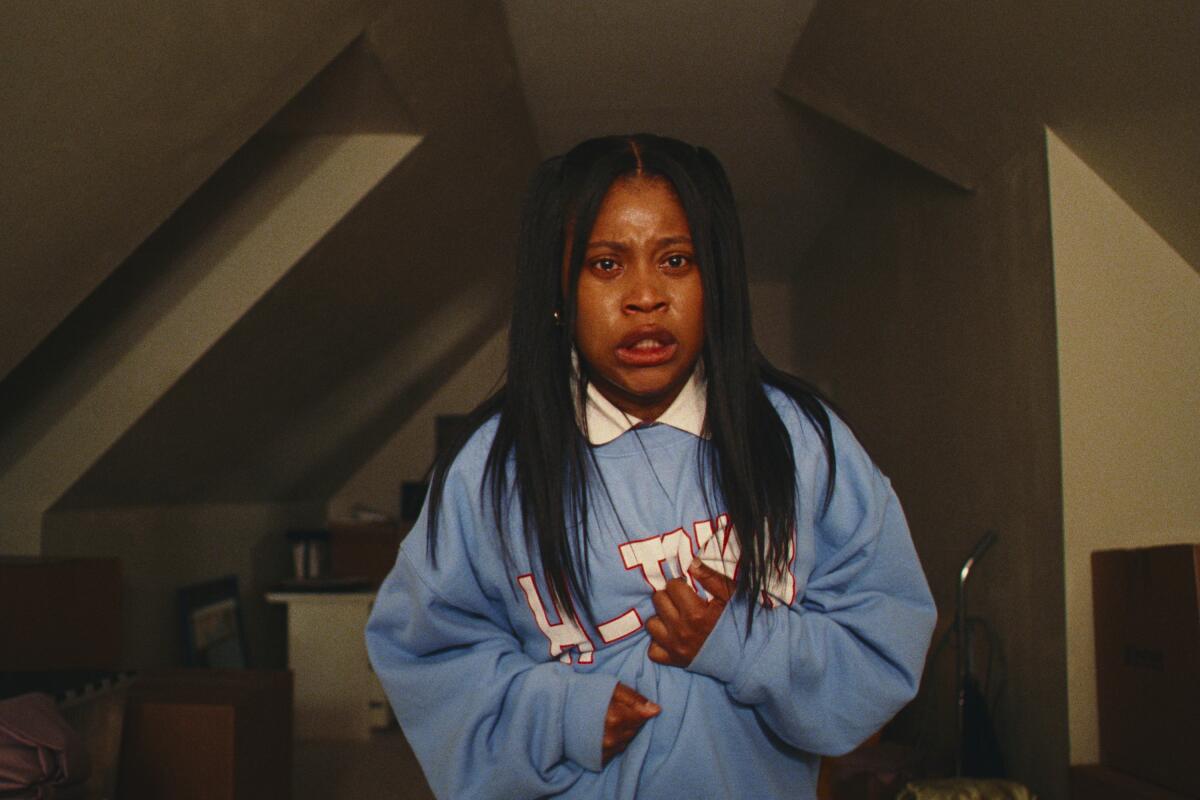
When fleshing out Ni’Jah‘s career, Nabers turned to several unforgettable moments in Beyoncé’s life (including that now-infamous elevator moment and the time someone bit her face) and re-created them for the screen.
“Obviously all of these people are public figures and legally, you can’t use the real footage,” she explained. “So we made the footage [ourselves] and they’re a lot of fun. We were able to re-create every single moment within that time span. When we sat down to look at that period in history, it really was about the feeling those moments gave you. Everyone remembers where they were when the elevator moment happened. It’s undeniable that there are moments with musicians that shift culture.”
“[Plus] the murders are reenactments,” she added. “Everything that you see throughout this show is something that has been researched and examined. And so I think we did a really good job at allowing our audience to live in these little American moments that actually have existed, but people just don’t know about.”
The “Judas and the Black Messiah” actress writes books, TV pilots and, someday, songs. She’s also an avid fan of romances.
Fishback was originally approached to play Dre’s sister, Marissa. “As an actor who wants the opportunity to challenge myself, I was chomping at the bit to see what that would be like,” she said. “After I said I wanted it, and [Donald Glover] was like, ‘Well, it’s yours.’ I was like, ‘Oh man, what did I get myself into?
“The most [clear direction] that Donald gave me was that Dre was emotionally stunted,” she added. “They didn’t give me a lot on the paper so it was really up to me. I decided I wouldn’t try to orchestrate how she was going to move; I was going to let the clothes and the hair and my fellow actors influence me.”
“Donald and I talked a lot about how she’s our interpretation of someone who is a bit of an alien in her own world,” said Nabers. “We drew from a lot of European movies, watched a lot of the Criterion Collection and we’re both really big fans of Michael Haneke — this really incredible German director who’s done some really cool French films. That was a huge influence for us. We looked at ‘The Piano Teacher,’ which is one of the most out-there movies I’ve ever seen in my life.”
Or is it a ‘maximalist’ ‘thought experiment’? Director Hiro Murai explains the FX comedy’s Europe-set third season.
Dre was heavily influenced by the psychological drama’s protagonist, Erika (played by Isabelle Huppert), the titular instructor who is sexually repressed and lives with her domineering mother. “We follow her perspective the entire movie,” said Nabers. “She doesn’t speak a lot, but she is one of the most memorable characters in cinema history.”
Nabers also pulled inspiration from iconic serial-killer movies and morally ambiguous protagonists like Tony Soprano. “The feeling that Tony Soprano gives you where you’re watching him and he’s mesmerizing, but also terrifying. I think a lot of those characters that we call iconic [rely] on their dangerousness and in their charisma and the power to hold space,” said Nabers. “A lot of those characters have been reserved for white people in TV and film, white men especially. So we wanted to take some of that white male energy and channel it into a Black woman who gives zero f—s.”
“I watch movies like ‘Monster’ with Charlize Theron, ‘Boys Don’t Cry’ with Hilary Swank and [‘The Dark Knight’] with Heath Ledger as the Joker and all of these artists got to build a character,” said Fishback. “A lot of times for Black actresses, we play ... not necessarily stereotypical [roles], but it’s something that we’ve often been seen as. I’m so blessed I got to do it with this character.”
“There’s something about these characters that’s compelling in some way, despite their evilness,” said Nabers. “I think there’s something about the tug of war with the mind trying to figure out or rationalize how a serial killer gets away with what they did for so long. There’s a little bit of [this person] playing a part, which I think is really interesting. It’s a tale as old as time, it’s America. Serial killers have always existed and they always will.”
“Swarm” premieres Friday at SXSW and begins streaming March 17 on Prime Video.
More to Read
The complete guide to home viewing
Get Screen Gab for everything about the TV shows and streaming movies everyone’s talking about.
You may occasionally receive promotional content from the Los Angeles Times.
